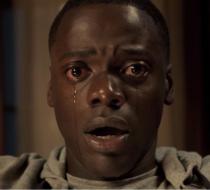"Get Out" Favorite
Jordan Peele discovered halfway through the making of “Get Out” what story he wanted to tell: A horror-thriller for black audiences that delivered a searing satirical critique of systemic racism.
“The writing of (‘Get Out’) started with me starting to make my favorite horror-thriller that’s never been made before,” Peele said Wednesday during a keynote conversation at Variety‘s Inclusion Summit. “Halfway through writing the project is when I realized what it was actually about.”
Moderated by Variety chief film critic Peter Debruge, the conversation focused on how Peele approached the making of his first feature film. Before “Get Out,” Peele was known as a comic, a sketch artist from his time on Comedy Central’s “Key and Peele.”
Peele said he wanted to make a film for black audiences, who gravitate toward horror films but often are frustrated with unrealistic decisions made by lead characters. Using “The Amityville Horror” as an example, Peele said the white family remained in the house despite suspicions it was haunted. A black family, he said, would have been long gone at the first sign of spookiness.
“The black audience goes to watch horror-thriller and we are usually very vocal about not getting the movie that we want,” Peele said.
But it wasn’t a supernatural force, nor a knife-wielding serial killer that would provide the most scares in “Get Out.” The film’s monster is systemic racism, in this case portrayed through the white characters.
“You find the insidious qualities that white liberals have,” Peele said. “The gut punch of the movie is ultimately meant to say that racism is a human problem and the ‘woke’ people know not to call themselves ‘woke.'”
The “sunken place” that the lead character falls into when he’s under hypnosis, Peele said, was a metaphor. It’s “this state of marginalization that I’ve never really quite had a word for,” he said. “The sunken place is the prison-industrial complex, it’s the dark hole we throw black people in.”
The metaphor also extends to the multiplex. “The sunken place is the theater that black people are relegated to watching horror movies on the screen. We can scream at the screen but we’re not going to get represented on the other side,” he said.
Speaking more broadly about the success of films featuring previously untold stories — like “Hidden Figures,” which told the story of the black women integral to the U.S. space program – Peele said the common thread was freshness.
“Time and time again you realize that the more truth you’re hitting on that people haven’t seen put in this way, the more successful it is,” he said.







